The Newcastle upon Tyne Hospitals NHS Foundation Trust made headlines in 2019 as the first healthcare organisation to declare a climate emergency. Four years on, and one pandemic later, I visited the Newcastle Hospitals Sustainability Team in February 2023 to learn more how they are driving the Trust towards net zero and the challenges they still face.
The Newcastle upon Tyne Hospitals NHS Foundation Trust comprises two main hospitals and some smaller community sites. Led by James Dixon, Associate Director of Sustainability, the Trust’s sustainability team is situated in the estates department and tackles the hospitals’ environmental impact from waste to energy.
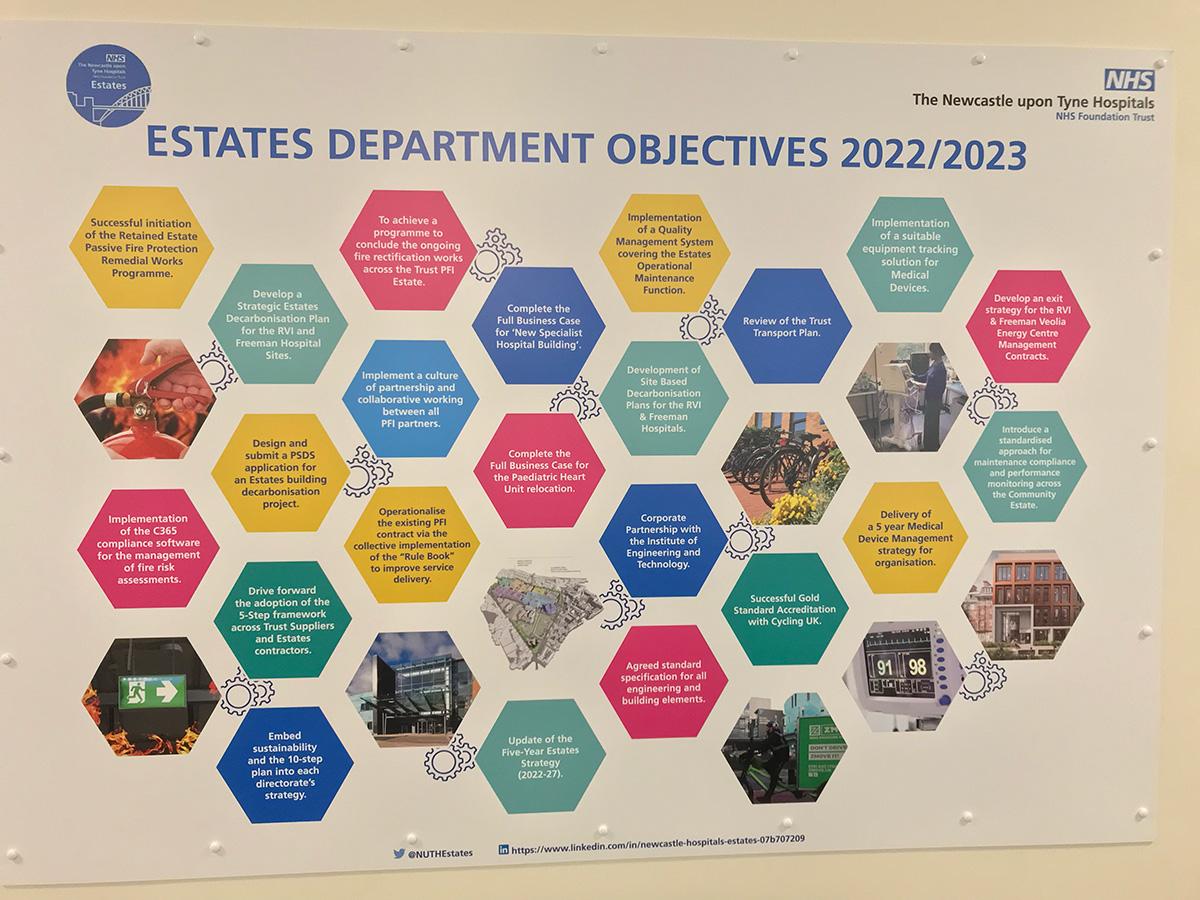
One key aspect of the sustainability team’s work is raising awareness amongst their colleagues. Through a number of training initiatives, spanning in intensity, the team lifts up ‘green champions’ amongst healthcare staff. Participants come from diverse clinical and non-clinical backgrounds and voluntarily attend these sessions to not only understand the team’s sustainable healthcare activities but also why it is done and how they can support this work.
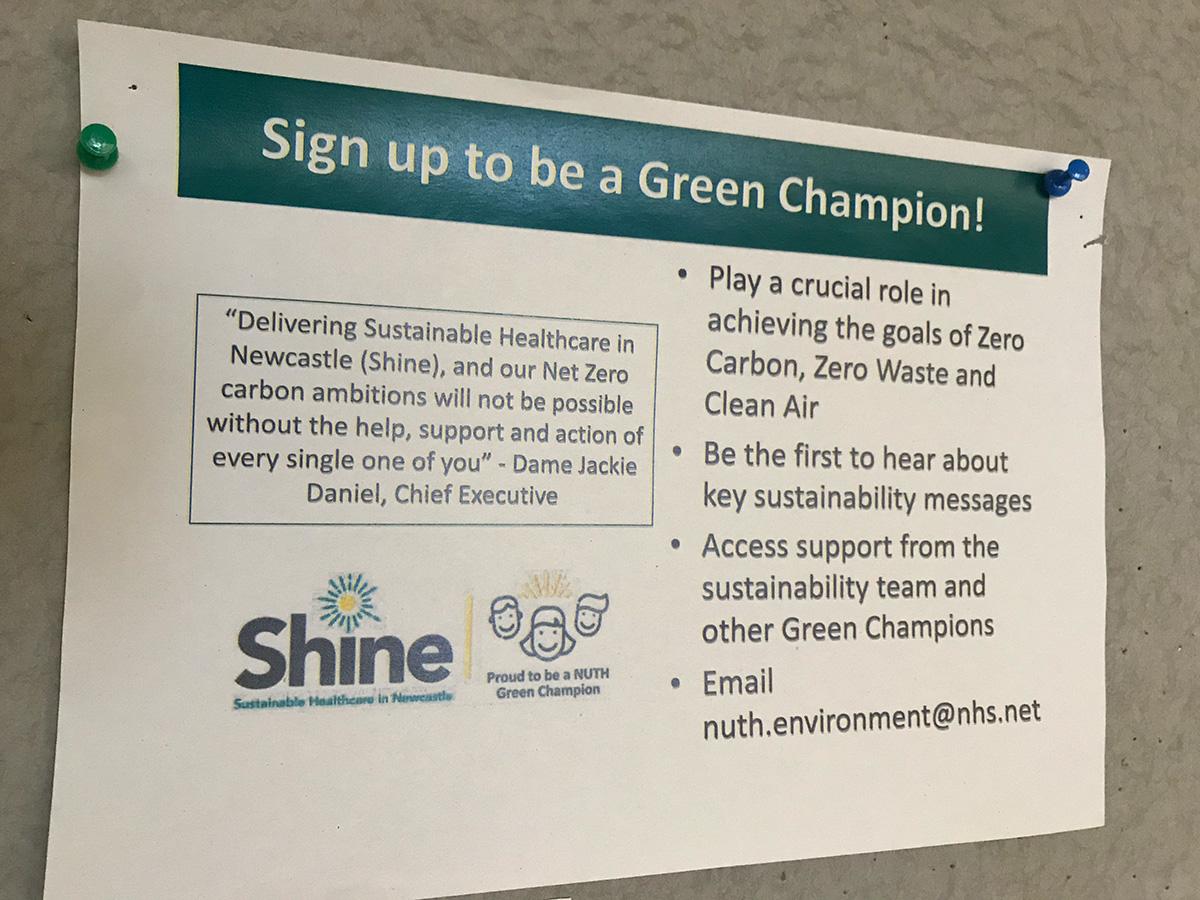
Assistant Sustainability Manager, Laura, conducted the training module Leading in the Transition to Net Zero. Lasting two hours (plus a 30-minute exercise), this session serves as an introduction for clinical and non-clinical staff to the need for action on sustainability within the healthcare trust.
The team also offer a more advanced training course lasting five hours that explains in detail the sustainability team’s work on a variety of topics, including waste.
Sustainable waste management in healthcareWaste Manager Jason participated in the training and explained how and why waste is segregated across the hospital - drawing attention to the varying costs and environmental impacts of different waste treatment methods.
Jason also showed me around the site’s waste management facilities and explained how they introduced a new waste stream, ‘tiger waste’, named for its striped coloured bag. Tiger waste is non-infectious medical waste that was previously included in medical waste for incineration but is now sent to waste-to-energy - one step up the waste hierarchy model.
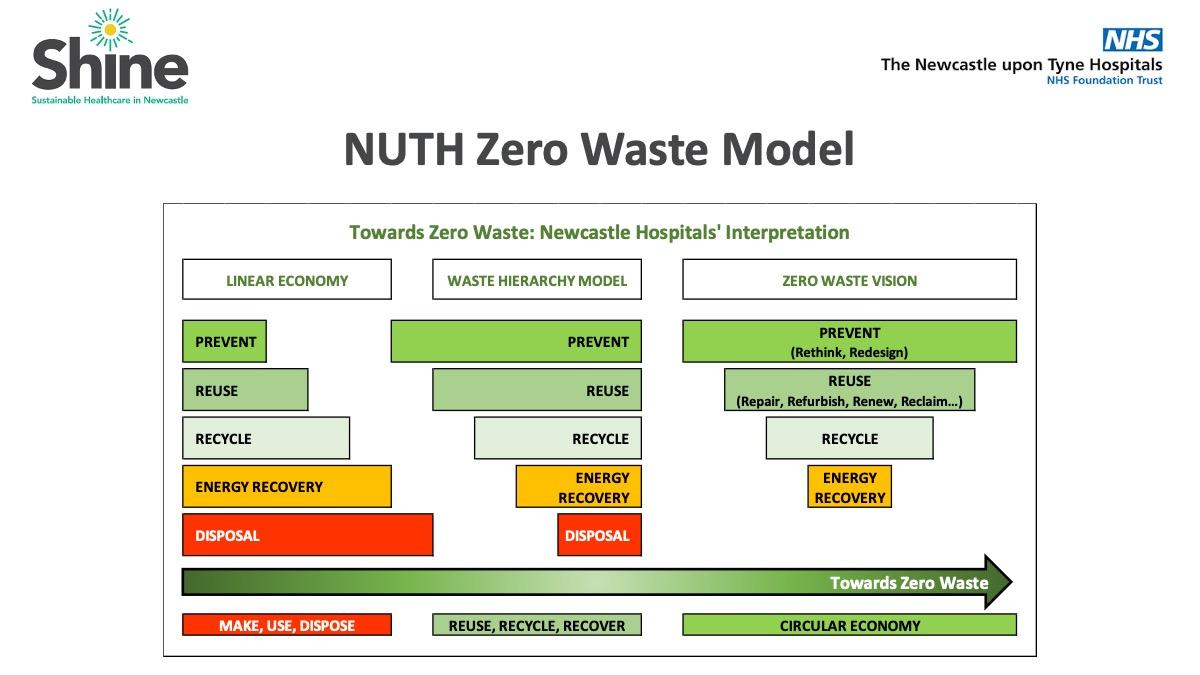
The ambition is to move all waste management up the waste hierarchy whenever possible and reduce waste at the bottom of the model, i.e. incineration, waste-to-energy, and recycling. Preventing waste in the first place is the ultimate goal for sustainable healthcare waste management - but it is a shared responsibility across the healthcare system and represents a shift in thinking. Purchasing decisions have a great influence on waste generation - Jason says that we need to “buy less and buy better!”, prioritising single polymer products with less packaging. Such products will be more easily reused or recycled - if nothing else, this reduces costs!
As well as training sessions, the sustainability team have placed their waste management policy on the hospital-wide intranet and they also conduct on-site waste audits to raise awareness among all staff.
Waste audits
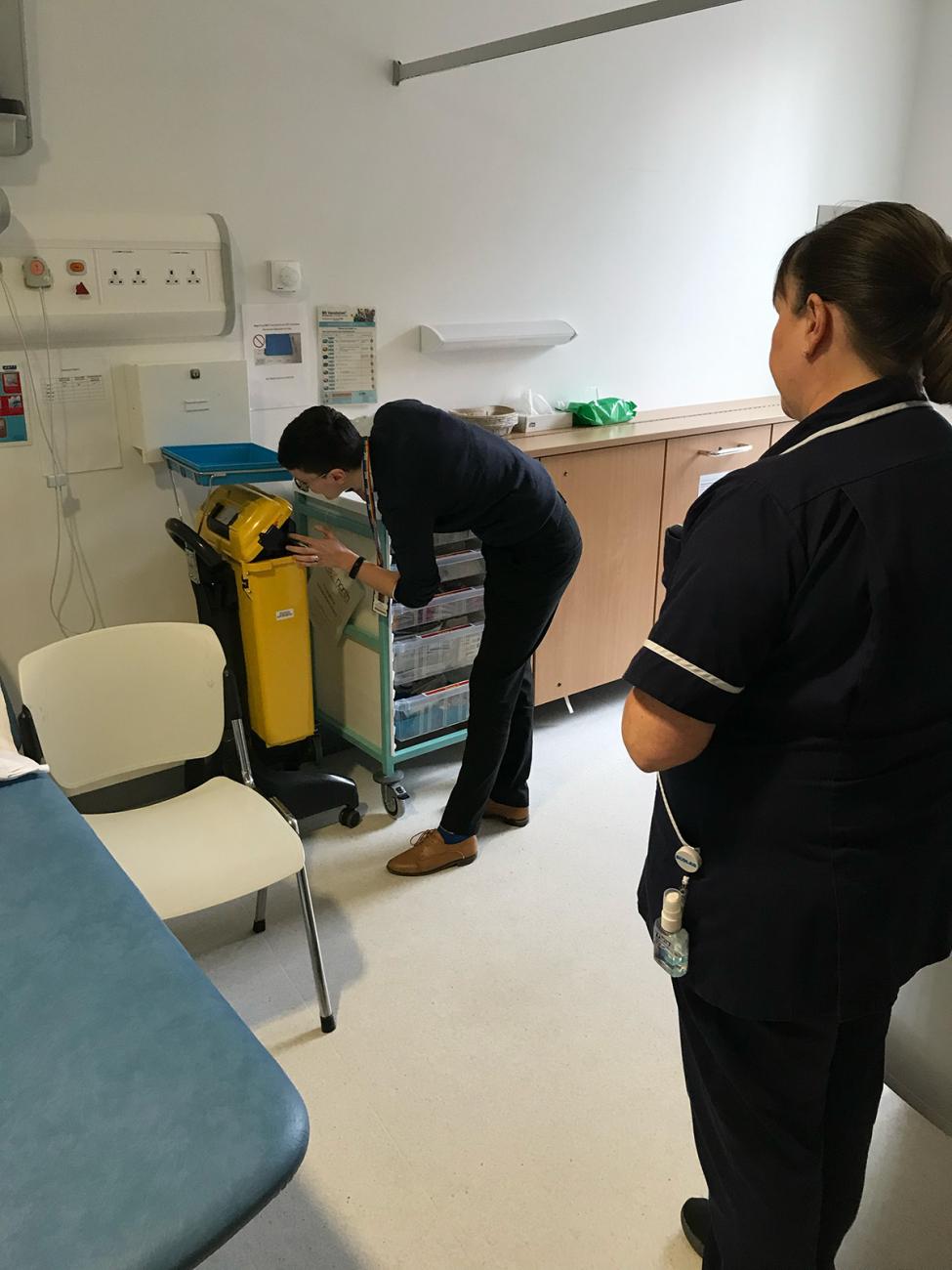
The audit also includes a short quiz for ward staff on the Trust’s waste segregation policies. The waste team regularly carry out these audits across different departments of the hospital. Using a standardised framework, they provide the ward with a score and note down any actions that need to be taken. This exercise is repeated, allowing for benchmarked comparisons.
Collaborating on sustainable healthcareWhilst the Trust is a leader in the region, the team are aware of the challenges they face and acknowledge that there is much more work to be done. Their ‘Red Flag report’ (2022) highlights that, despite Newcastle Hospitals’ advanced sustainability initiatives, the Trust has not yet reduced its carbon footprint sufficiently. Change will not happen overnight, as this is a long-term process and Newcastle Hospitals cannot do this alone. The Trust looks to closely collaborate with other healthcare providers and partners in the region and internationally through the GGHH network.
Energy Manager Cara, invited me to observe a meeting between Energy leads from across the region’s healthcare. The North East and North Cumbria Integrated Care System (NENC ICS) includes local councils and voluntary and community services that provide health and care across North East England. The energy sub-group regularly meets to identify common challenges and solutions for reducing the energy demands of healthcare services across the region. As the largest Trust in the region, Newcastle Hospitals have made great strides in reducing their energy use, but need the support and advice of others to innovate and scale up the impact.
Video | Our ambition to become England's greenest region by 2030
The sustainability team also closely collaborate with their procurement supply chain, directly speaking to suppliers and measuring Scope 1, 2, and 3 carbon emissions. Sustainability Manager, Anna-Lisa leads the Trust’s work in this area, who will now only work with suppliers that can provide a measurable carbon reduction plan for their products and services - soon to be an NHS-wide requirement for suppliers.
At the end of my visit, I spoke with Dr Vicky McFarlane Reid, who leads on sustainability at board level. They have empowered James and the sustainability team to act on these important issues whilst directing the hospital board towards climate action.
ConclusionsI spent one week with the team and saw so much of the varied work they are doing, but it still barely scratches the surface. It was helpful to see this important work in the context of the everyday challenges - on more than one occasion, a colleague’s attention was taken away to address a delivery or equipment error. Emerging as a sustainable healthcare leader in 2019 was a lonely prospect and the Trust now seeks to lift up other healthcare partners and help share the responsibility of decarbonisation and waste reduction and support Newcastle Hospitals.
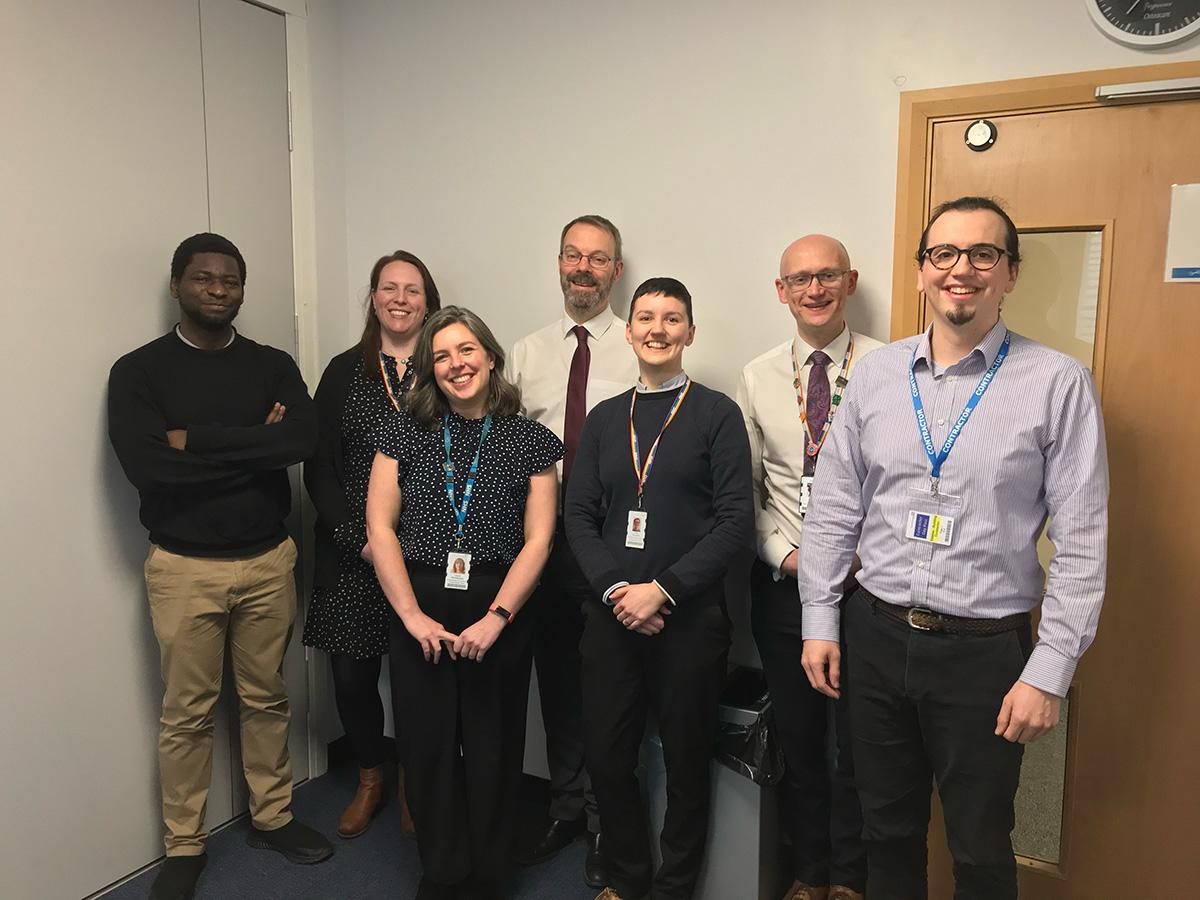
My eternal gratitude to James and all of the passionate Newcastle Hospitals Sustainability Team for their time, patience, and cups of tea. You can learn more about the team’s work in their annual Shine reports - Sustainable Healthcare in Newcastle.
Lloyd’s placement in Newcastle is part of HCWH Europe’s Member Placement Programme – helping the team to connect more closely with members.
Learn more about the programme here